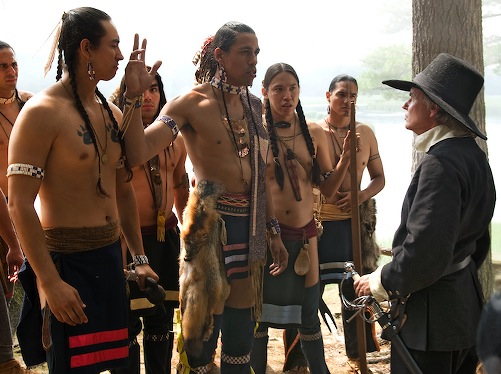PBS' We Shall Remain struggles to light the torch
04/13/09 01:54 PM

By ED BARK
Worthy and well-meaning, PBS' five-part, seven-and-a-half hour We Shall Remain nonetheless falls short of a firm grip with Monday's opening chapter.
The 90-minute "After the Mayflower" (8 to 9:30 p.m. central) is overly long, dry and redundant in its depictions of how 17th century relations unraveled between Native Americans and the first English settlers at Plymouth. Historians and scholars add what turn out to be a steady diet of less than scintillating comments, with actor Benjamin Bratt serving as narrator.
The overall effect is disappointingly flat, even with occasional sweeping visuals and reenactments that have a suitable air of authenticity. "After the Mayflower," airing under the esteemed American Experience banner, doesn't so much draw you in as let you down. It's hard to keep from wondering what Ken Burns might have done with this important subject. He almost certainly would have done better than this.
The five films within We Shall Remain will be airing on successive Mondays through May 11th. They aim to document "five pivotal moments when Native Americans pushed back," co-executive producer Sharon Grimberg says in an accompanying video press kit supplied by PBS.
I've only seen Monday's first film, so maybe some of the others will be far superior. In order they are:
April 20 -- "Tecumseh's Vision"
April 27 -- "Trail of Tears"
May 4 -- "Geronimo"
May 11 "Wounded Knee"
All told, the films span 350 years of history, with an eye toward recounting it from the Native American perspective. That's a noble and ambitious undertaking. But a strong, pulsating start is mandatory to keep viewers primed to go the distance. "After the Mayflower" instead seems sluggish, in the end failing to ignite.
GRADE: C+
|
